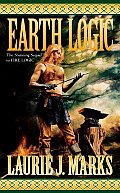
| Series: | Elemental Logic #2 |
| Publisher: | Tor |
| Copyright: | March 2004 |
| Printing: | June 2005 |
| ISBN: | 0-7653-4838-1 |
| Format: | Mass market |
| Pages: | 436 |
Earth Logic is the second book in the Elemental Logic series, following Fire Logic. It does not stand on its own; it's a story continuation, makes repeated reference to events from the previous book, and starts with the full cast of that book, with very little explanation of what happened previously. Not only would I recommend against reading it out of order, but I would also recommend reading it close in temporal proximity to Fire Logic.
Sadly, I did not do this; I read it about four years later, and had forgotten all of the characters and much of the plot. As a result, I struggled through the first part of this book, trying to place the characters and connect the dots of half-described previous events. Sometimes this is fun; here, it was remarkably frustrating. While this is partly my fault (I had both books and just didn't get around to reading the second one), I have a long-standing plea for authors: please put a summary of the previous books in the start of a multivolume epic! I truly do not understand why people are so opposed to doing this, and instead simply start subsequent books assuming the reader remembers, or awkwardly mix a summary of events into the first few chapters. Both of these alternatives are significantly inferior to a simple several-page summary of the highlights of the previous volume at the start of the book. People who don't like such things can skip it trivially, and it would have been a huge help. I know it's hard to summarize a complex plot, but all I would have needed were a few more jogs to my memory to make the start of this book much more enjoyable.
Anyway, rant aside, this is a return to the land of Shaftal and the cast built up by Fire Logic, particularly Karis and Zanja (although many of the other characters play significant roles). It's a story of continued resistance against the Sainnites; it's also the story of the Sainnites themselves, who get a viewpoint character and who are in possibly an even worse trap. And it's Karis's story, even more than Fire Logic was, as one might expect from the title.
As with Fire Logic, the largest problem with this book is that it's slow in places. This time, the slowness is mostly front-loaded: the story starts out with matters in uneasy equilibrium and with the characters, Karis in particular, very afraid of breaking that equilibrium. This is tied deeply into a tension between Karis and Zanja, and between earth and fire logic, that I never completely understood, and which therefore lacked impact for me. The solutions the characters pursued were quite strange, at least to me. In places, I had to just roll with it.
But once the story gets moving, about halfway or three-quarters through, it turns into a deep meditation on the nature of societies and conflict, pulling in attitudes towards violence that you don't get to see much in traditional fantasy (particularly fantasy which, like this series, tends towards the military and martial). This clearly works in this world in ways that it couldn't in ours, but those ways are themselves fascinating. Karis is a wonderful character in large part due to her attitude towards power. And the book as a whole I think captures a piece of "earth logic": slowly accumulating weight until it reaches a tipping point, and falling in an inexorable landslide of motion towards a surprising conclusion. The interleaved Sainnite perspective added tremendously to the story and gave the reader an inside look at the sort of transformation that slowly built up through the novel.
I think my favorite part of Marks's world of Shaftal is its much broader understanding of family and how people interact with those families. The main characters serve as one example from the start, but there are several other important ones, including some sharp contrasts with the life of the Sainnites. It's such an open, welcoming, and sensible way of going about family and interpersonal relationships, but it's rare to see the implications chased as completely as they are here. It also helps that Karis is an absolute delight, incorporates many key aspects of that understanding of life, and is persistently herself even in the middle of a protracted civil war.
Earth Logic clearly doesn't complete this series, but it moves the world to a new place and provides a satisfying conclusion to the problems it tackles. It's slow to start, and frustrating if you don't remember the previous book well, but it's very much worth the read. There are moments in it that are purely delightful, and I loved the ending. It also has a marvellous cover that captures Karis extremely well.
Recommended, but read as part of the series.
Followed by Water Logic.
Reviewed: 2011-10-28